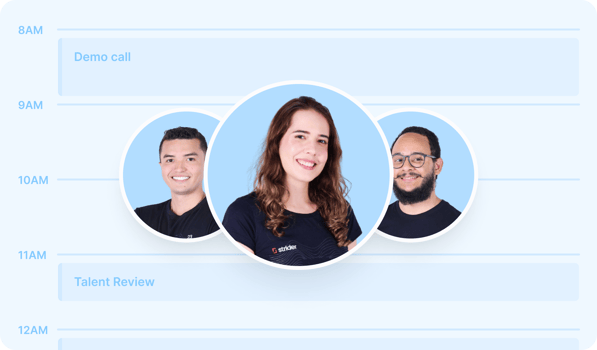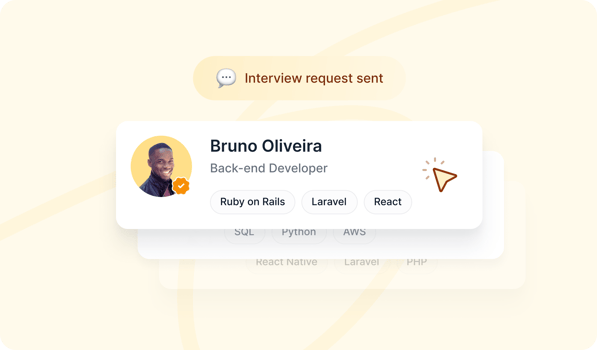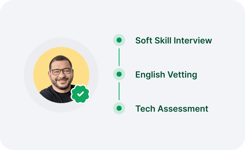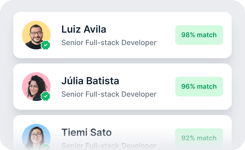Hire Remote DevOps Engineers Effectively in 2025
Businesses are increasingly relying on DevOps practices to streamline their software development process and operations teams. DevOps engineers play a crucial role in this process by combining their technical skills with a deep understanding of software development, deployment, and continuous integration. As a result, hiring skilled DevOps developers has become essential for organizations looking to stay competitive in the market.
DevOps developers are responsible for bridging the gap between development and operations teams, ensuring smooth collaboration, and optimizing the software delivery and deployment process. They possess expertise in various DevOps tools and practices, such as configuration management, continuous integration, and automation. Additionally, their knowledge of cloud platforms like AWS (Amazon Web Services), Google Cloud Platform, and tools such as Docker and Kubernetes make them valuable assets in deploying applications to production environments.
This article will explore practical strategies and best practices for hiring the best DevOps engineers. We will discuss the essential skills and qualifications to look for in qualified candidates and provide insights into the interview process and common questions that can help you build a highly skilled DevOps team. Whether you are looking to hire a DevOps engineer for a specific project or seeking to extend your team for long-term engagements, this guide will provide you with comprehensive solutions to meet your business requirements.
What to Look for When Hiring DevOps Engineers
Technical Skills
When hiring experienced DevOps engineers first, it is crucial to assess their technical skills to ensure they possess the necessary expertise for the role. DevOps engineers should deeply understand various DevOps tools and practices, including configuration management, continuous integration, and automation tools. They should be proficient in cloud platforms such as AWS (Amazon Web Services) and Google Cloud Platform, as well as containerization technologies like Docker and Kubernetes.
Knowledge of scripting languages and experience with web applications are also valuable skills. A good grasp of software development processes and a basic understanding of CI/CD (continuous integration/continuous delivery) pipelines are essential for effective collaboration with software developers and operations teams.
Communication Skills
Effective communication is a crucial skill for DevOps engineers. They must collaborate with stakeholders, including software developers, operations teams, and project managers. DevOps engineers should be able to clearly articulate technical concepts, explain their work to non-technical team members, and listen actively to understand project requirements and concerns.
Strong written and verbal communication skills are essential for documenting processes, sharing information across teams, and facilitating smooth coordination. Additionally, the ability to adapt communication styles to suit different audiences and to foster a collaborative and inclusive work environment is highly valuable.
Cloud Engineering and Infrastructure as Code
Cloud engineering is an essential technical topic to consider when hiring DevOps engineers. They should have a solid understanding of cloud computing principles and experience working with cloud platforms like AWS and Google Cloud. Proficiency in managing cloud resources, deploying applications in cloud environments, and optimizing performance and cost efficiency for cloud engineers are valuable skills.
Moreover, familiarity with infrastructure as code (IaC) tools like Terraform or CloudFormation is essential for automating the provisioning and management of cloud resources. This enables DevOps engineers to effectively scale applications, ensure consistency across environments, and facilitate seamless deployment processes.
Continuous Improvement and Automation
Continuous improvement is a fundamental aspect of good DevOps engineer practices. DevOps engineers should be proactive in identifying areas for optimization and streamlining workflows. They should possess a mindset of continuous learning and stay updated with industry trends and emerging technologies.
Automation is crucial to achieving efficiency and scalability in software development and operations. DevOps engineers should have expertise in automation tools and frameworks like Ansible, Jenkins, or GitLab CI/CD. They should be able to design and implement automated processes for infrastructure provisioning, application deployment, testing, and monitoring, enabling faster and more reliable software delivery.
Top 5 DevOps Developer Interview Questions
What are the key elements of continuous testing tools?
Asking this question allows you to evaluate a candidate's familiarity with Continuous Testing, a crucial aspect of the DevOps process. A comprehensive answer should include an understanding of test automation, understanding test data management, and test reporting.
A candidate who can discuss specific Continuous Testing tools like Selenium or Jenkins demonstrates practical experience in implementing and integrating testing frameworks into the software development process.
What is the difference between a centralized and distributed version control system (VCS)?
This query helps determine a candidate's understanding of version control systems, which is an integral part of DevOps practices. By inquiring about the differences between centralized and distributed VCS, you can gauge the candidate's knowledge of critical concepts like repository models, collaboration workflows, and branching strategies.
A firm answer should highlight the advantages and disadvantages of each system and provide examples of popular VCS tools such as Git or Subversion.
What is the process for reverting a commit that has already been pushed and made public?
This question tests a software engineer candidate's source code management proficiency and ability to handle potentially critical situations. A suitable response should cover identifying the commit to be reverted, creating a new commit to reverse the changes, and pushing the updated code to the repository.
Additionally, the candidate should demonstrate an understanding of the implications of reverting commits and the importance of communicating with the development team and stakeholders throughout the process.
What is Git bisect? How can you use it to determine the source of a (regression) bug?
By asking about Git bisect, you can evaluate a candidate's problem-solving skills and familiarity with debugging techniques. A firm answer would explain that Git bisect is a command-line tool that performs a binary search through a project's commit history to identify the specific commit that introduced a bug.
The candidate should discuss using Git bisect, including marking excellent and bad commits, running automated tests, and iteratively narrowing down the range of commits until the problematic commit is found.
Can you explain the "Shift left to reduce failure" concept in DevOps?
This query evaluates a candidate's understanding of DevOps practices and their ability to explain important principles. A comprehensive response should describe the concept of shifting left in the software development lifecycle, emphasizing the early involvement of testing, security, and other quality-related activities.
The candidate should discuss how moving left improves the overall quality of software, reduces the likelihood of failures in production, and enables faster feedback loops for developers to address issues early on.







